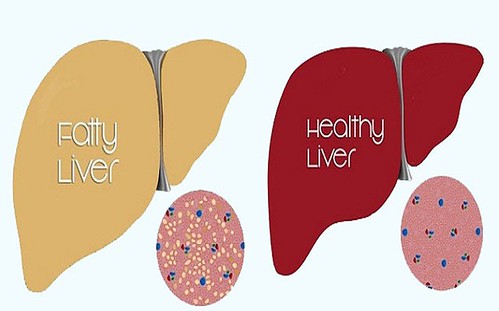Share on Pinterest Wegovy resolved liver inflammation in nearly two-thirds of participants in a major clinical trial, twice the rate seen with placebo. Steve Christo-Corbis/Getty ImagesWegovy (semaglutide) could offer a new option to treat severe liver disease based on new clinical trial evidence.The GLP-1 drug resolved liver inflammation in nearly two-thirds of participants, twice the rate seen with placebo.Semaglutide had a favorable safety profile, with serious adverse events occurring at the same rate as placebo.
Wegovy, a highly effective medication used to treat obesity, shows promise in treating a serious form of liver disease in a new clinical trial.
The trial, funded by Novo Nordisk, the manufacturer of Wegovy (semaglutide), found the drug improved liver inflammation, scarring (fibrosis), and sometimes both in people with metabolic dysfunction-associated steatohepatitis (MASH). The results were published on April 30 in The New England Journal of Medicine.
MASH is an advanced stage of metabolic dysfunction-associated steatotic liver disease (MASLD), a condition formerly known as nonalcoholic fatty liver disease. MASLD involves the buildup of fat in the liver, which can cause inflammation, liver cell injury, and fibrosis.
About one-third of adults in the United States have MASLD. While not all cases lead to liver damage, about 5% of adults develop MASH, a more severe and potentially progressive form of the disease.
Untreated, MASH can lead to life threatening complications, including cirrhosis of the liver, liver failure, and liver cancer.
Currently, the only FDA-approved treatment for MASH in people with moderate to severe liver fibrosis is Rezdiffra (resmetirom), which received approval in March 2024. With few options available, the study authors note an urgent need for additional treatments.
Sun Kim, MD, an associate professor of Endocrinology at Stanford Medicine who wasnt affiliated with the trial, echoed that assessment.
Patients with diabetes are at high risk for MASLD, especially MASH and advanced fibrosis. Patients with advanced fibrosis are at higher risk for complications, including liver cancer and early death, Kim told Healthline. Thus, we need more treatment options.
The authors also point out that Wegovy may provide added benefits by addressing the comorbidities commonly seen in people with MASH, such as cardiovascular disease and obesity, a cluster of conditions known as cardiovascular-kidney-metabolic syndrome.
Its definitely exciting to have another therapeutic, said Kim. Liver inflammation resolved in two-thirds of participants
A randomized, double-blind, placebo-controlled study is considered the gold standard in clinical research. The new study was part of an ongoing phase 3 clinical trial involving nearly 1,200 individuals.
The interim analysis for these findings included 800 participants, who were mostly white adults evenly split between males and females, with an average age of 56. The majority (72%) were classified as obese based on body mass index (BMI), and more than half were also living with type 2 diabetes.
After 72 weeks of treatment, nearly two-thirds of participants who received Wegovy showed resolution of liver inflammation (steatohepatitis) without any worsening of fibrosis, almost twice the rate seen in the placebo group.
In addition, 37% of Wegovy users saw a reduction in liver fibrosis without a worsening of MASH, compared to 22% in the placebo group.
A smaller subset just under one-third experienced both benefits: reduced fibrosis and resolved inflammation. That combined improvement was seen in only 16% of those receiving a placebo.
These results underscore the challenge of treating MASH. Inflammation and fibrosis are distinct disease processes, and a drug may improve one without affecting the other. As this trial shows, achieving both outcomes remains difficult.
While some participants did achieve both outcomes simultaneously, an ideal therapeutic goal, this combined outcome was less common than improvement in either condition alone.
That complexity helps explain why so few medications have received FDA approval for MASH. Targeting both aspects of the disease at once remains a significant challenge.
There are over 20 drugs in phase 2 and 3. However, it is difficult to reverse liver fibrosis. I describe fibrosis to patients as liver scarring due to inflammation associated with liver steatosis/fat. Its easier to prevent the injury than to reverse the scar, said Kim.
Wegovy also showed a favorable safety profile. By week 72, 88% of participants were able to maintain their target dose.
Overall, adverse events were slightly more common in the Wegovy group (86%) than in the placebo group (79%). However, both groups experienced the same rate of serious adverse events (13%).
The most common side effects in both groups were gastrointestinal. Participants taking Wegovy more frequently reported: nauseadiarrheaconstipationvomiting Wegovy improved comorbid health conditions
The trial also revealed compelling secondary benefits, with improvements in key comorbidities, including: type 2 diabetes obesitycardiovascular risk markers
Most notably, people taking Wegovy lost significantly more weight than those receiving a placebo an average of 10% of body weight compared to just 2%.
Wegovy was also linked to modest improvements in cardiovascular health, including slightly lower blood pressure, triglyceride levels, and cholesterol.
In addition, participants taking Wegovy both with and without type 2 diabetes saw improvements in hemoglobin A1C, a measure of long-term blood sugar regulation. This effect may not be surprising, as semaglutide is already FDA-approved for diabetes management under Novo Nordisks other brand name, Ozempic.
The authors note that semaglutide had a holistic therapeutic approach to both liver disease and associated cardiometabolic illnesses.
These results lend further credence that semaglutide is the Swiss army knife of medicine we have been looking for, to treat obesity, cardiovascular disease, type 2 diabetes, and now MASH, Beverly Tchang, MD, an endocrinologist and assistant professor of clinical medicine at Weill Cornell Medicine, not affiliated with the trial, told Healthline. Learn more about how to get semaglutide and other GLP-1 medications from vetted and trusted online sources here:Where to Buy Ozempic OnlineWhere to Buy Ozempic OnlineHow to Get Mounjaro (Tirzepatide)Where to Buy Mounjaro (Tirzepatide) OnlineHow to Get Wegovy for Weight Loss In Person and OnlineHow to Get a Wegovy Prescription OnlineHow to Get Zepbound: What We Know So FarWhere to Buy Zepbound Online
